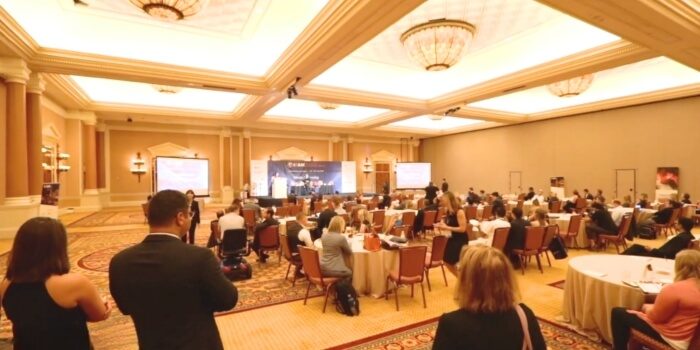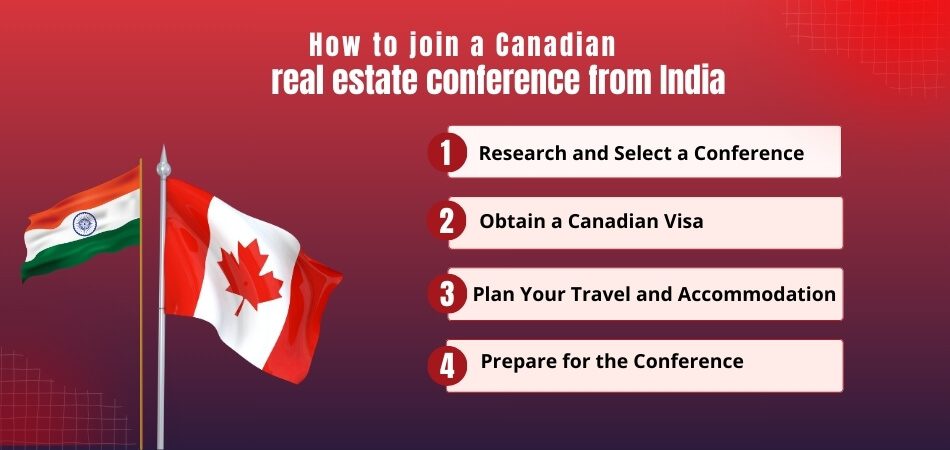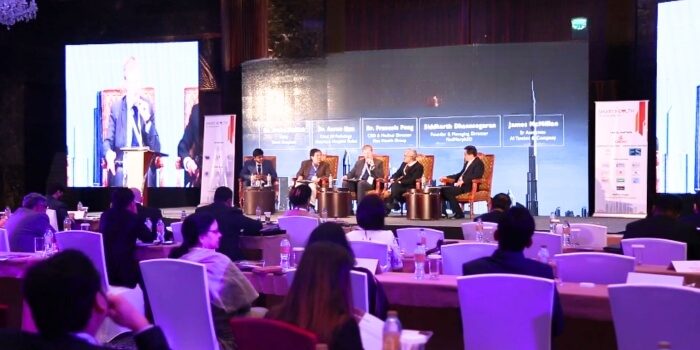An opportunity to expand your knowledge and network with industry leaders can be found at a real estate and urban planning conference in Canada. You can enjoy an outstanding leadership conference, surrounded by renowned experts and enthusiasts from all around the world. Also, discuss the latest trends and innovations in real estate and urban planning. But how can you make this happen? To be precise, how to attend a real estate and urban planning conference in Canada from India?
To attend a real estate and urban planning conference in Canada from India, start by registering for a suitable conference and then apply for a Canadian visa with the conference invitation letter. Once you get the visa, you can focus on planning your trip, attending key sessions, and making the most of your networking opportunities.
Curious about more? Follow along as we dive into the details in the rest of this article.
Purpose of Real Estate and Urban Planning Conference in Canada
A real estate and urban planning conference in Canada is an excellent platform for exchanging ideas and supporting innovation. It brings together industry professionals, including developers, architects, planners, and policymakers, to discuss emerging trends, share insights, and explore new opportunities within the real estate and urban planning sectors.
These events are more than just a series of lectures; they offer interactive sessions where attendees can engage in discussions, workshops, and case studies. This collaborative approach allows participants to learn directly from experts, gain practical insights, and exchange solutions to common challenges in urban development.
Attendees can expect to gain valuable knowledge on market dynamics, sustainable development, and technological advancements that are advancing cities and communities. By joining Real Estate and Urban Planning Conference, participants can better contribute to creating more livable, resilient, and future-ready urban spaces, making the conference experience both professionally enriching and impactful.
Can You Attend a Real Estate and Urban Planning Conference in Canada from India?
Yes, you can certainly attend a real estate and urban planning conference in Canada from India. It’s a fantastic opportunity to gain international insights and expand your professional network. Here’s why.
Visa Accessibility
Canada provides various visa options for conference attendees from India, making the process of obtaining travel documents more accessible. Options include a Visitor Visa (Business), which covers conference attendance. The application process is straightforward but requires careful document preparation, such as the invitation letter, proof of financial stability, and other supporting documents.
Global Networking
Real estate and urban planning conferences in Canada attract a diverse range of professionals from around the world. This setting offers unique opportunities for networking, collaboration, and exchanging ideas with experts in the field. Engaging with international participants not only broadens your professional network but also introduces you to diverse perspectives and innovative practices.
Educational Opportunities
Attending a conference in Canada exposes you to different methodologies, trends, and best practices in real estate and urban planning. Participants benefit from engaging presentations, workshops, and discussions that can improve their skills and knowledge. It’s an excellent opportunity to learn about global developments and innovative strategies that can be applied to your work back home.
Cultural Experience
Attending a conference in Canada is not just about professional development but also a chance to experience Canadian culture. You can explore Canada’s urban landscapes, enjoy local cuisine, and engage with the country’s cultural diversity. This personal growth experience enriches your perspective, making your visit both educational and memorable.
Don’t forget that planning and preparation are key. Make sure to check the conference details, visa requirements, and travel arrangements well in advance to ensure a smooth and productive trip.
How to Attend a Real Estate and Urban Planning Conference in Canada from India?
For professionals seeking to expand their horizons and connect with global experts, attending a real estate and urban planning conference in Canada offers a unique opportunity.
But how exactly do you go about it? The process involves several steps, from obtaining the necessary travel documents to making the most of your time at the conference. Now, we’ll walk you through the process of ‘How to attend a real estate and urban planning conference in Canada from India?’ and provide some tips to ensure a fruitful experience.
Step 1: Research and Select a Conference
Start by researching upcoming real estate and urban planning conferences in Canada. Review event options, focusing on the best Real Estate and Urban Planning Conference that offers valuable sessions and expert speakers. Review the conference agenda, speakers, and networking opportunities. Register for the event and note the dates and location.
Step 2: Obtain a Canadian Visa
As an Indian citizen, you’ll need a Canadian visa to attend the conference. Apply for a temporary resident visa (TRV) or an electronic travel authorization (eTA), depending on your eligibility. Ensure you have a valid passport, and prepare the necessary documents, such as a conference invitation letter, proof of accommodation, and financial statements, to support your visa application.
Step 3: Plan Your Travel and Accommodation
Book your flights and accommodations well in advance to secure the best deals. Consider staying near the conference venue for convenience. Check for any travel advisories and plan accordingly. Keep copies of your booking confirmations for reference during your trip.
Step 4: Prepare for the Conference
Familiarize yourself with the conference agenda and identify the sessions and workshops you want to attend. Prepare any questions you may have for the speakers or panelists. If you’re presenting, ensure your presentation materials are ready and practice your delivery.
Step 5: Network and Engage
Conferences are great networking opportunities. Bring plenty of business cards and be ready to introduce yourself to other attendees. Engage in discussions, exchange ideas, and make connections that could benefit your career or business.
Step 6: Follow Up Post-Conference
After the conference, follow up with the contacts you’ve made. Connect with them on LinkedIn, send thank-you emails, and explore potential collaborations or opportunities for further learning.
Step 7: Reflect and Apply Learnings
Take some time to reflect on your conference experience. What new insights did you gain? How can you apply what you’ve learned to your work? Sharing your learnings with colleagues or through professional networks can also be beneficial.
Step 8: Plan for Future Conferences
If you found the conference valuable, consider attending similar events in the future. Stay informed about upcoming conferences in your field and start planning early to make the most of these opportunities.
By following these steps, you can successfully attend a real estate and urban planning conference in Canada from India and make the most of the experience for your professional development.
What Are the Agendas of A Real Estate and Urban Planning Conference in Canada?
A real estate and urban planning conference in Canada is not just a gathering; it’s a powerhouse of ideas and strategies. It’s where the brightest minds in the industry come together to initiate the transformation of our cities and communities. So, what’s on the agenda at these conferences? Let’s take a look.
| Agenda | Discussion | Ways Ahead |
| Market Trends and Analysis | Insights into the current real estate market, including forecasts and investment opportunities. | Staying informed about market trends and analysis to capitalize on investment opportunities and make informed decisions. |
| Sustainable Development | Exploring eco-friendly practices and green building techniques to promote sustainability in urban planning. | Implementing sustainable practices and green building techniques in urban planning for a greener future. |
| Technology in Real Estate | Discussing the impact of emerging technologies like AI, VR, and IoT on the industry. | Welcoming AI, VR, and IoT for smarter, more efficient real estate practices and enhanced customer experiences. |
| Urban Regeneration | Strategies for revitalizing and redeveloping urban areas to upgrade livability and economic growth. | Implementing strategies for urban renewal to create vibrant, sustainable communities that attract residents and businesses. |
| Housing Policies and Regulations | Examining government policies and their implications on housing markets and urban development. | Analyzing housing policies’ impact on housing markets and urban development for informed decision-making and sustainable growth. |
| Infrastructure Planning | Diving into the planning and development of essential infrastructure, including transportation and utilities. | Enhancing infrastructure planning to support urban growth and ensure sustainable, efficient transportation and utility services. |
| Real Estate Finance and Investment | Penetrating the financial aspects of real estate, from funding projects to maximizing returns on investment | Maximizing returns on real estate investments through informed financial strategies and innovative funding solutions. |
| Networking Opportunities | A chance to connect with fellow professionals, share experiences, and build valuable relationships in the industry. | Leveraging networking opportunities to forge valuable connections, share insights, and cultivate professional relationships within the industry. |
Each of these agendas plays a crucial role in shaping the future of real estate and urban planning, making these conferences a must-attend for anyone looking to make their mark in the field.
Does Attending a Real Estate and Urban Planning Conference Impact Your Career?
If you’re interested in global perspectives, attending Real Estate and Urban Planning Conference in Canada is a great way to gain insights and develop new skills. These events are more than just a gathering of professionals; they’re a hub of knowledge, networking, and opportunities that can propel your career forward.
- Knowledge Enhancement: Conferences offer a platform to learn about the latest trends, technologies, and best practices in real estate and urban planning. This knowledge can keep you ahead in the industry and upgrade your expertise.
- Networking Opportunities: You get to meet and interact with industry leaders, peers, and potential mentors. These connections can open doors to new job opportunities, collaborations, or partnerships.
- Skill Development: Many conferences offer workshops and sessions focused on skill development. These can help you acquire new skills or refine existing ones, making you more valuable in your field.
- Visibility and Recognition: Presenting your work or ideas at a conference can increase your visibility in the industry. It’s an opportunity to showcase your expertise and gain recognition among your peers.
- Inspiration and Motivation: It can be inspiring to hear success stories and innovative ideas at conferences, motivating you to start on creative projects or take your career in a fresh direction.
An urban planning or real estate conference can enhance your career by enhancing your knowledge, expanding your network, and raising your profile.
Tips for Great Real Estate and Urban Planning Conference Experiences
Attending a real estate and urban planning conference can be an enriching experience, but it’s essential to approach it with the right mindset and preparation. Here are some tips to ensure you have a great conference experience:
- Set Clear Objectives: Know what you want to achieve from the conference. It could be learning about new trends, networking, or finding potential clients.
- Plan Your Schedule: Review the conference agenda and plan your schedule. Prioritize sessions that align with your goals and interests.
- Engage Actively: Participate in discussions, ask questions, and engage with speakers and attendees. Active involvement will improve your learning experience.
- Network Strategically: Identify key individuals you want to connect with and make an effort to introduce yourself. Remember, quality is more important than quantity when it comes to networking.
- Follow-Up: After the conference, follow up with the contacts you’ve made. Send a personalized message or connect on LinkedIn to keep the conversation going.
- Reflect and Apply: Take time to reflect on what you’ve learned and how you can apply it to your work. Sharing your insights with your team or through a blog post can also be valuable.
Frequently Asked Questions
Conferences in Canada offer valuable opportunities for networking and professional growth. Planning your trip involves understanding the requirements and processes for attending. Here are some frequently asked questions to help you prepare effectively:
How Much Is a Conference Visa to Canada?
The cost of a conference visa to Canada typically ranges from CAD 100 to CAD 200. The fee depends on the type of visa and additional services, like biometrics. It’s advisable to check the latest fees on the official Canadian immigration website for accurate information. Be prepared to pay the fee online through approved payment methods.
How Long Can I Stay in Canada with a Conference Visa?
With a conference visa, you can usually stay in Canada for up to 6 months. The exact duration is determined by the immigration officer at the port of entry based on your itinerary. Ensure your documents clearly outline your visit’s purpose and length to avoid confusion. Always double-check your visa’s expiration date before planning your return trip.
Do I Need a Letter of Invitation to Attend a Conference in Canada?
Yes, a letter of invitation from the conference organizers is often required when applying for a visa. This letter must detail the purpose of your visit, the event’s agenda, and confirm your registration. It serves as proof of your participation, which is crucial for the visa application process. Request this letter soon after registering to ensure timely submission.
What Documents Do I Need to Apply for a Conference Visa to Canada from India?
In addition to a valid passport and completed visa application form, you’ll need a letter of invitation from the conference organizer. Other required documents include proof of accommodation, a return flight ticket, and financial statements to demonstrate your ability to support yourself during your stay. Make sure all documents are updated and clear for faster processing.
Final Thought
Consequently, participating in a real estate and urban planning conference in Canada from India is a valuable opportunity for professional development. The key steps include researching and selecting a conference, registering for the conference, obtaining a Canadian visa, planning your travel and accommodation, and actively engaging in the event.
When considering “How to attend a real estate and urban planning conference in Canada from India?”It’s essential to prepare thoroughly and network effectively. For a smoother travel experience, book your hotel reservations in advance and follow up with your contacts post-conference. By following these tips, you can ensure a rewarding conference experience.








